风萧萧_Frank
以文会友对世界上大多数人来说,台湾并非官方意义上的“国家”。但它的微芯片却让人难以忽视。
台湾在高需求半导体行业中处于无与伦比的全球领先地位。
克里斯·布朗 · CBC 新闻 · 2025 年 10 月 17 日
克里斯·布朗是加拿大广播公司驻伦敦分社的外国记者。此前,克里斯曾在莫斯科工作,他热爱报道精彩的故事,并曾走遍加拿大乃至世界各地寻找灵感。
一群人正在研究展出的计算机设备。2024 年 6 月,在台湾首都台北举行的 Computex 上,人们正在研究展出的设备。世界上没有任何地方能与台湾在制造或代工市场上取得的技术成就相提并论。 (Anne Wong/路透社)
台湾新竹科学园区绿树成荫的街道两旁,未来主义风格的仓库里林立着微芯片制造工厂,这些工厂安全可靠,与外界隔绝,访客受到严格管控。
在工厂内部,无尘实验室里装有机器人,它们以纳米级精度蚀刻硅片,打造世界上最先进的处理器。
人工智能数据库、iPhone、汽车以及几乎所有现有的数字技术都依赖于它们。
地球上没有任何其他地方能与台湾在制造或代工市场上取得的技术成就相提并论。
据估计,台湾半导体制造公司(台积电)一家公司就控制着全球约70%的芯片市场,而最先进的芯片市场更是高达90%。
对于一个拥有2300万人口的岛屿来说,这是一个了不起的成就,在世界上大多数国家眼中,台湾并不存在官方名称。
除十几个小国外,加拿大与所有其他国家一样,承认位于北京的中华人民共和国政府,但不承认台湾。中国视台湾为一个分裂的省份。
一位黑发年轻女子戴着眼镜。台湾大学生林艾米在台北接受加拿大广播公司(CBC)采访。(Angela Johnston/CBC)
然而,最近对许多台湾人来说,这种不被认可的感觉似乎不那么轻视了。
“我们不必太担心别人不在乎我们,”21岁的大学生林艾米在台北光华数码广场(一个被称为电脑街的电子市场)购物时说道。
“我们有晶圆(微芯片),所以我们有东西可以与其他国家谈判。这无疑增强了我们作为一个国家的信心。”
不再是“沉默的国家”
研究台湾半导体产业及其对地缘政治影响的分析师对此表示赞同。
“几十年来,台湾一直保持沉默,”民主、社会与新兴技术研究中心(DSET)首席执行官张志强(Jeremy Chang)说道。该研究中心是一家研究地缘政治与台湾半导体产业之间联系的智库。
他的话与一部2023年拍摄的台湾纪录片《隐形国家》的片名相呼应。这部纪录片记录了台湾在共产主义中国的阴影下,长期努力摆脱戒严,成为一个繁荣的民主国家。
“这对台湾来说是一个非常具有变革意义的时刻,我们终于有机会与志同道合的盟友进行谈判或对话了,”张志强说道。“几乎所有国家都需要非常新的半导体。你不能再忽视台湾了。”
一位身穿棕色夹克的黑发男子用手比划着。张志强是民主、社会与新兴技术研究中心(DSET)的首席执行官,该研究中心研究地缘政治与台湾半导体产业之间的联系。 (安吉拉·约翰斯顿/加拿大广播公司)
张忠谋表示,世界正处于他所描述的人工智能时代的“第一页”,接下来的发展将“与人类迄今为止经历的完全不同”。
他指的是,机器人、无人机和人工智能领域的显著进步都将以半导体为基础。
台湾副总统萧美琴在接受加拿大广播公司新闻采访时强调,台湾制造业的成功并非偶然。
直面台湾的抵抗。如果中国入侵,民防组织随时待命。
“台湾确实受到了世界上大多数不承认台湾地位的国家的不公平对待,”她说道。
“我们花了几十年的时间建设,也经历了几十年的艰辛,”萧美琴说道,并强调了各国政府40多年来建立起来的战略投资、规划和培训项目。
她表示:“在非常艰难的国际环境下,台湾成功构建了最全面、最具竞争力的生态系统之一,为半导体芯片的高端制造提供支持。”
观看 | CBC 记者 Chris Brown 采访台湾副总统:
副总统表示,台湾在全球芯片领域的主导地位并非“一夜之间”实现的。
10月17日 |
时长 9:13
台湾副总统萧美琴在接受 CBC 新闻采访时表示,台湾在芯片领域的竞争优势在于
台湾制造业历经数十年的艰辛才得以建立。她发表此番言论之际,台湾正面临着将更多生产转移至美国的压力,以及来自中国的持续军事压力。
认可半导体先驱
对于30多年前开创台湾半导体产业的先驱们来说,这一成功无疑是一次非凡的认可。
“我认为当时没有人相信这个(新竹)工业园,因为当时没有多少人知道该如何推进,”科技企业家吴敏在自己创立的旺宏电子股份有限公司办公室接受采访时说道。
1989年,吴敏在斯坦福大学获得学位并在加州硅谷工作数年后回到台湾。
当时,日本公司占据了半导体市场的大部分份额,但吴敏表示,通过设计和建造一座完全计算机化的晶圆厂,他能够提高效率和芯片质量。
一位身穿黑色夹克的灰发男子用手比划着。
吴敏英创立了位于台湾新竹科学园区的旺宏电子。(Angela Johnston/CBC)
旺宏电子后来成为闪存芯片制造领域的全球领导者,其产品广泛应用于汽车和任天堂等电子游戏机。
“我们逐渐看到了这些努力的成果。十年后,我们发现我们的质量远远高于其他任何公司,”吴敏英说道。
对于台湾的政策制定者来说,现在的关键问题是如何利用台湾在全球供应链中不可或缺的地位来实现其政治目标。
9月下旬,在与南非的外交争端中,台湾曾短暂提出,可能以扣留微处理器作为惩罚,以惩罚台湾在南非的代表权被降低。
企业寻求从中国实现多元化。如今,特朗普的关税将对这些亚洲替代产品造成沉重打击。
中国对美国模拟芯片贸易政策启动反歧视调查。
但这种直截了当的威胁最终可能只是昙花一现。台北官员似乎很快改变了主意,同意进行更多谈判。
分析人士表示,制造微芯片可能并非一种特别有效的胁迫手段,因为台湾本身并不设计或销售其生产的芯片。例如,台积电为其他公司生产半导体。
台湾也没有能力像美国或中国那样,将其金融体系推向国际,并对相关产品实施出口管制。
中国最近对几种稀土矿实施了出口管制,以向美国施压。此前,美国已采取行动限制向中国公司销售半导体。
城市天际线中的高楼大厦。台湾首都台北的天际线以其最著名的地标建筑——台北101大楼为特色,它高耸于该市的金融区之上。 (安吉拉·约翰斯顿/加拿大广播公司)
中国频频挑衅
台北中央研究院国防与政治研究员傅荣南表示,他认为台湾应该依靠外交手段而非恐吓手段来赢得更多朋友。
“关键问题是,如果台湾遭到入侵,美国是否会出手相救,”傅荣南说道。
台湾几乎每天都面临着来自中国军方的军事挑衅,中国舰艇和飞机不断试探台湾的防御。例如,周二,台湾军方报告称,中国战斗机有16架次进入台湾防空识别区,同时还有舰艇入侵。
中国在台湾周边开展军事演习,称其总统为“寄生虫”
中国还在史无前例地大举生产弹道导弹和其他远程武器,这使得台湾本岛触手可及。
傅莹表示,台湾需要继续努力与美国和其他东亚国家建立更牢固的军事联盟,而融入全球供应链——尽管与中国大陆仍有一定距离——则强化了这一优势。
“台湾的角色实际上是成为美国构建的联盟的重要组成部分。美国已经明确表示,我们正在努力重建一条不受中国大陆影响的供应链。”
9月10日,在台北举行的SEMICON Taiwan 2025展会上,一块半导体晶圆正在一台机器上进行测试。(Ann Wang/路透社)
台积电已采取重大举措,通过在德国、日本和亚利桑那州建设最先进的晶圆代工厂,加强其在台湾以外的影响力。
尽管台积电将更多业务转移到海外,但DSET首席执行官张忠谋表示,由于该行业仍然紧密相连,台湾仍将是全球芯片中心。
“目前,他们必须把亚利桑那州晶圆厂生产的芯片送回台湾进行封装,”他指的是生产流程的最后阶段,这可以大大提高他们的效率。
台湾副总统萧敬腾表示,政府的重点仍然是加强伙伴关系。
“台湾一直致力于利用我们的“以积极的方式产生影响,”她表示,“我们将继续与世界各地拥有共同价值观和目标的朋友和伙伴携手合作。”
For most of the world, Taiwan doesn't officially exist. Its microchips make it hard to ignore
Taiwan is unparalleled global leader in high-demand semiconductor industry
 Chris Brown · CBC News ·
Chris Brown · CBC News ·
Chris Brown is a foreign correspondent based in the CBC’s London bureau. Previously in Moscow, Chris has a passion for great stories and has travelled all over Canada and the world to find them.
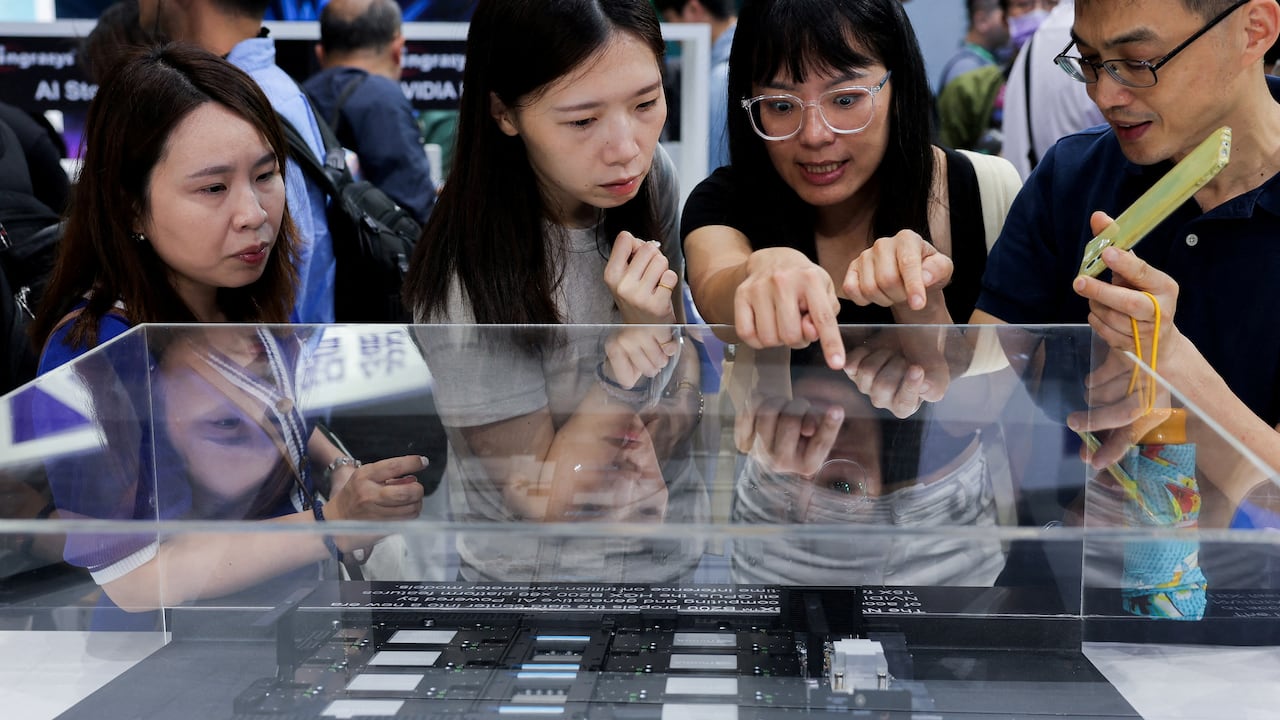 People are shown studying equipment on display at Computex in Taipei, Taiwan's capital, in June 2024. No other place in the world comes even close to Taiwan’s technological successes in the manufacturing, or foundry, market. (Anne Wong/Reuters)
People are shown studying equipment on display at Computex in Taipei, Taiwan's capital, in June 2024. No other place in the world comes even close to Taiwan’s technological successes in the manufacturing, or foundry, market. (Anne Wong/Reuters)
The microchip fabrication plants, or fabs, inside the futuristic warehouses that line the leafy streets of Taiwan’s Hsinchu Science Park are so secure and sealed off from the outside that visitors are strictly controlled.
Inside, dust-free labs house robotic machines that etch silicon wafers with nano-level precision, creating the world’s most advanced processors.
Artificial intelligence databases, iPhones, cars and practically every other piece of digital technology in existence depend on them.
No other place on the planet comes even close to Taiwan’s technological successes in the manufacturing, or foundry, market.
A single company, Taiwan Semiconductor Manufacturing Company, or TSMC, is estimated to control about 70 per cent of the world's chip market — and an astounding 90 per cent for the most advanced chips.
It's a remarkable achievement for an island of 23 million people that in the eyes of most of the world’s nations doesn’t officially exist.
Canada, like all but a dozen or so small states, recognizes the People’s Republic of China’s government in Beijing but not Taiwan, which China sees as a breakaway province.
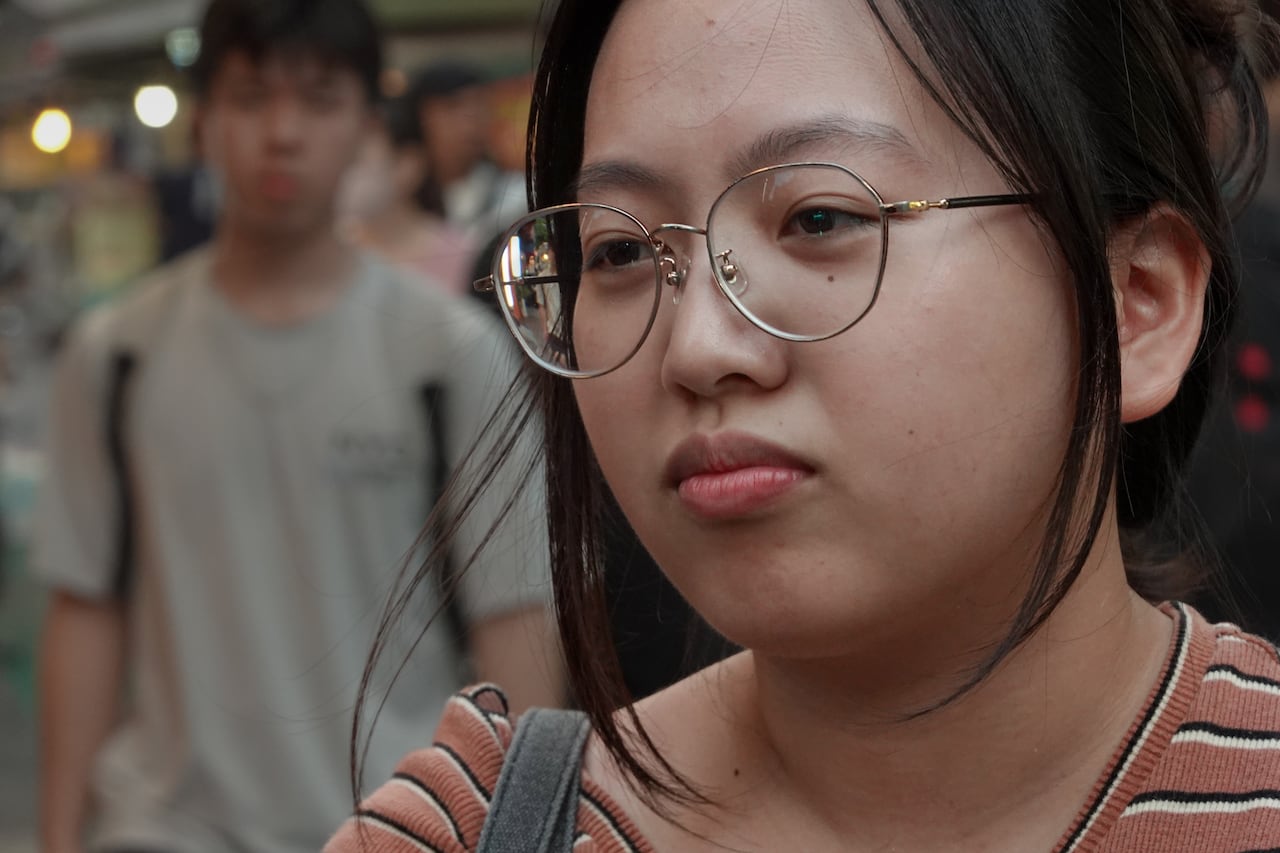 Taiwan college student Amy Lin speaks to CBC News in Taipei. (Angela Johnston/CBC)
Taiwan college student Amy Lin speaks to CBC News in Taipei. (Angela Johnston/CBC)
Lately, though, for many Taiwanese, that lack of recognition has felt like less of a slight.
“We don't have to worry too much that people don’t care about us,” said 21-year-old Amy Lin, a college student who was shopping in Taipei's Guanghua Digital Plaza, an electronics market known as Computer Street.
“We have wafers [microchips], so we have something to negotiate with others. It certainly boosts our confidence as a country.”
A 'silent nation' no more
Analysts who study Taiwan’s semiconductor industry and its impact on geopolitics concur.
“Taiwan has been a silent nation for decades,” said Jeremy Chang, CEO of the Research Institute for Democracy, Society and Emerging Technology (DSET), a think-tank that studies the links between geopolitics and Taiwan’s semiconductor industry.
His words echo the title of a 2023 documentary on Taiwan called Invisible Nation. The film chronicles the island’s long struggle to emerge from martial law and become a thriving democracy in the shadow of communist China.
“This is a very changing moment for Taiwan, that [we] finally get a chance to negotiate or to talk with like-minded allies,” Chang said. “Almost all the countries need very new semiconductors. You cannot ignore Taiwan anymore.”
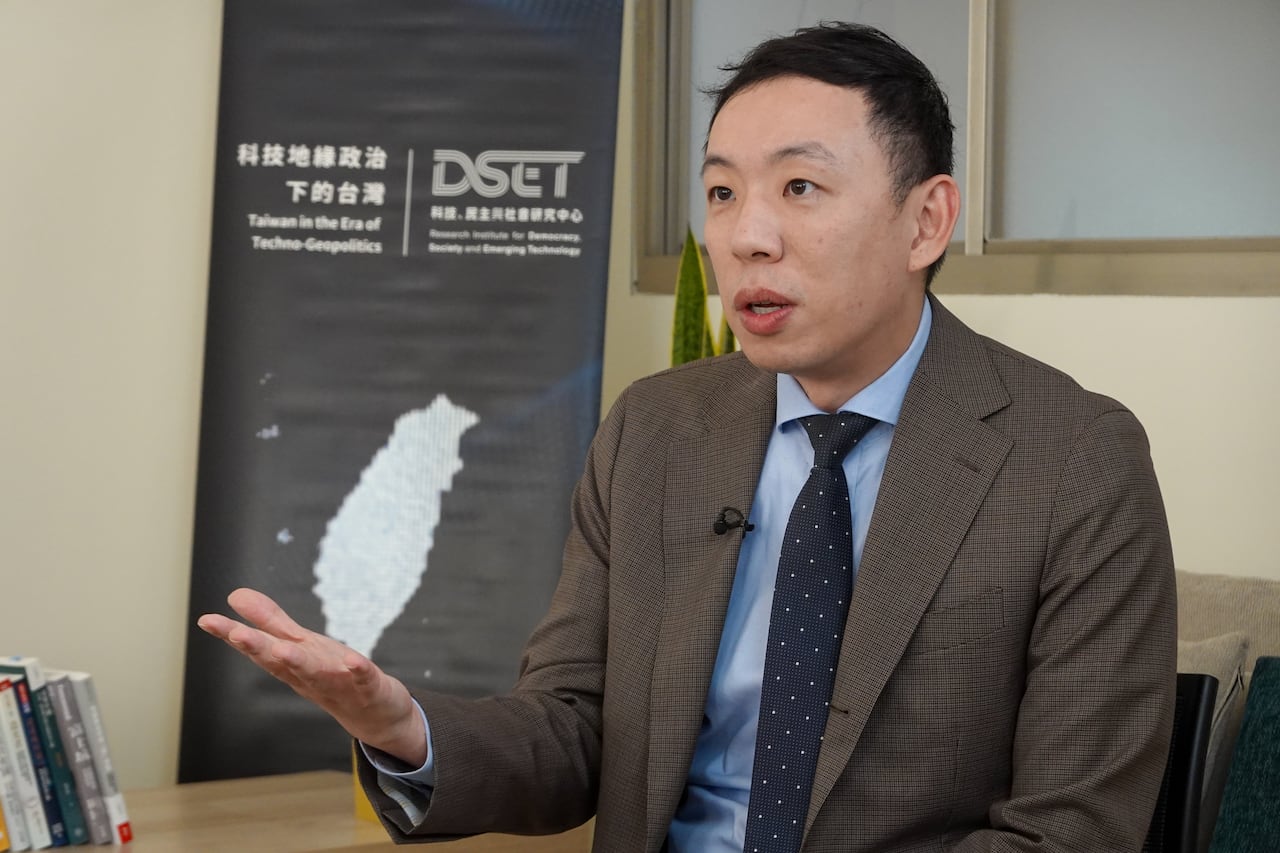 Jeremy Chang is CEO of DSET, the Research Institute for Democracy, Society and Emerging Technology, which studies the links between geopolitics and Taiwan’s semiconductor industry. (Angela Johnston/CBC)
Jeremy Chang is CEO of DSET, the Research Institute for Democracy, Society and Emerging Technology, which studies the links between geopolitics and Taiwan’s semiconductor industry. (Angela Johnston/CBC)
Chang said the world is on what he characterizes as “page one” of the artificial intelligence era, and the developments that come next will be ”totally different than what human beings have experienced so far."
By that he means that remarkable advances in robotics, drones and AI will all be anchored by semiconductors.
In an interview with CBC News, Taiwan’s vice-president, Hsiao Bi-khim, underscored that none of the island’s manufacturing success has happened by chance.
Meet Taiwan's resistance. If China invades, civil defence groups stand ready
“Taiwan has really been treated unfairly by the majority of countries around the world who do not recognize Taiwan's status,” she said.
“It took us decades to build, and it was also decades of hardship," Hsiao said, emphasizing the strategic investments, planning and training programs that have been built up by governments over 40 years.
“Under very difficult international circumstances, Taiwan managed to build one of the most comprehensive and competitive ecosystems that supports high-end manufacturing in semiconductor chips,” she said.
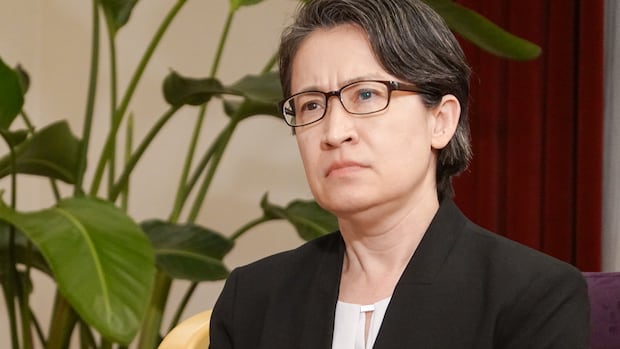
Taiwan’s global chip dominance did not ‘happen overnight,’ vice-president says
Validating semiconductor pioneers
That success is a remarkable validation for those who pioneered Taiwan’s semiconductor industry more than 30 years ago.
“I think nobody believed in this park [Hsinchu] because at that time, not many people knew how to proceed,” said tech entrepreneur Miin Wu, who was interviewed at the offices of Macronix International Co. Ltd., the firm he founded.
In 1989, Wu returned to Taiwan after earning a degree at Stanford University and working for several years in California’s Silicon Valley.
At the time, Japanese companies had a lock on the lion’s share of semiconductor business, but by designing and building a fully computerized fab, Wu said, he was able to increase efficiency and chip quality.
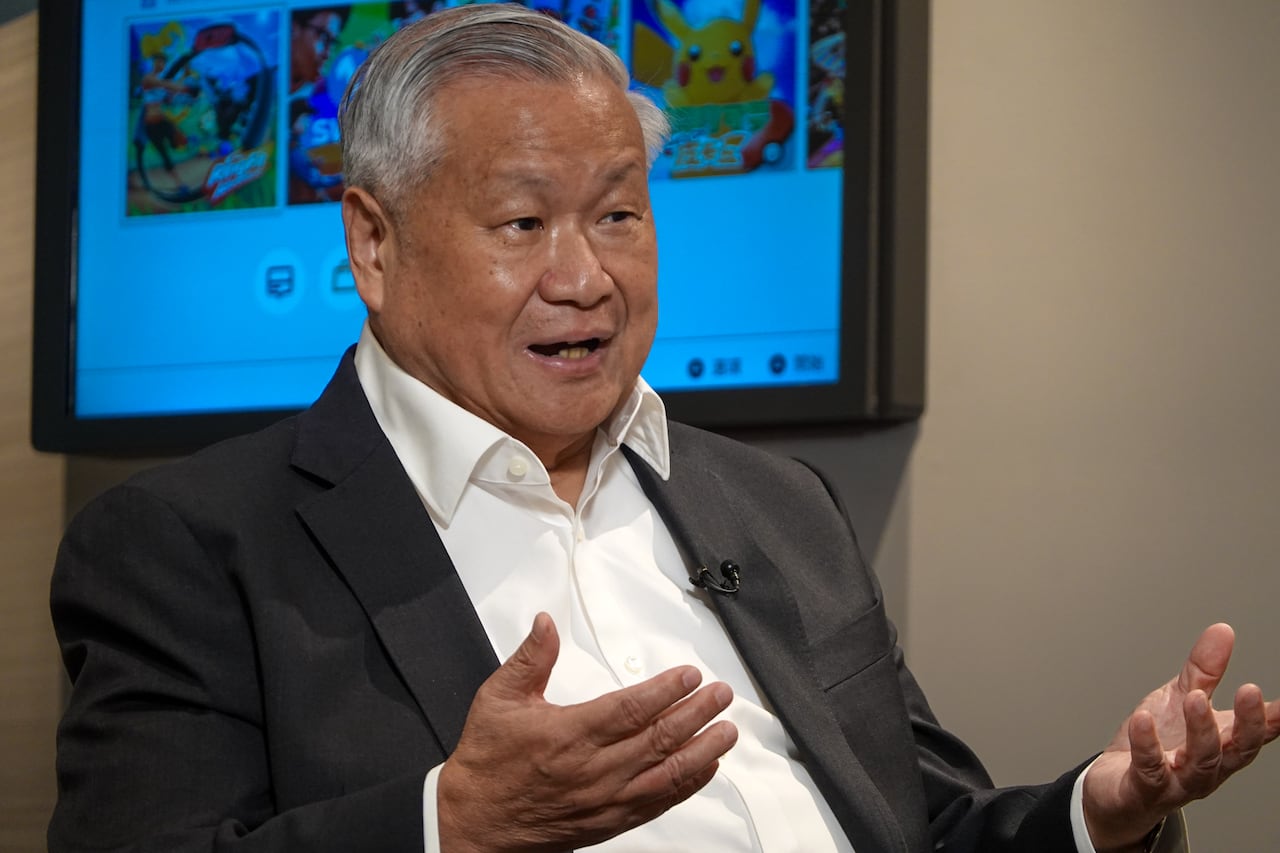
Macronix would go on to become a world leader in making flash memory chips that are used extensively in automobiles and video game consoles, such as Nintendo’s.
“Gradually we saw results from that work. Ten years later, we found our quality was way above everyone else," Wu said.
For Taiwan’s policymakers, the pertinent issue now is how to leverage the island's indispensable role in global supply chains to achieve its political goals.
In late September, during a diplomatic dispute with South Africa, Taiwan briefly raised the possibility of withholding microprocessors as punishment for downgrading the island’s representation in the country.
But that sort of blunt threat may end up being a one-off. Officials in Taipei appeared to quickly backtrack, agreeing to more talks instead.
Making microchips is likely not a particularly useful tool for coercion, say analysts, as Taiwan does not design or sell the chips it makes. TSMC, for example, manufactures semiconductors for other companies.
Nor does Taiwan have the ability to project its financial system internationally and impose export controls on items in the same way that the United States or China can.
China recently imposed export controls on several rare earth minerals to put pressure on the U.S., which had earlier moved to restrict semiconductor sales to Chinese companies.
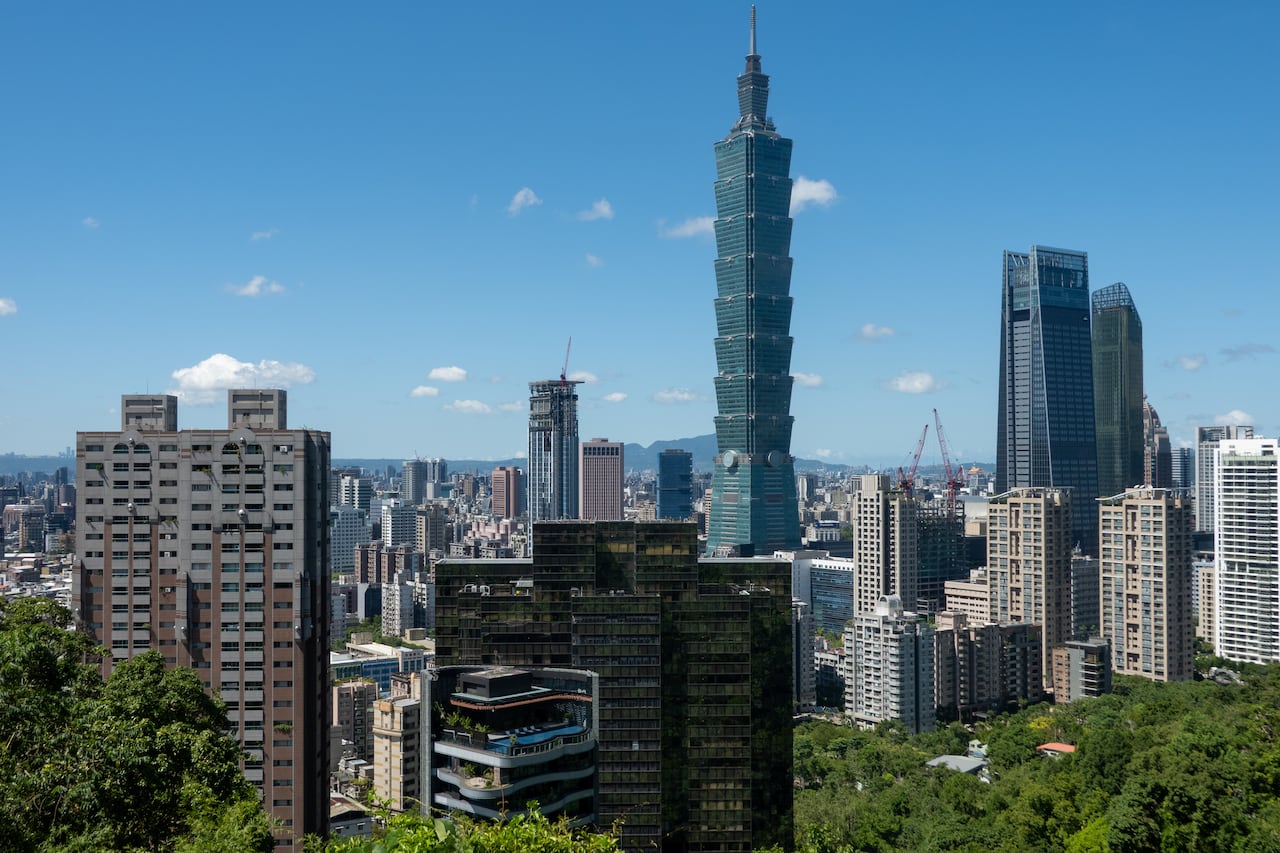 The skyline of Taipei, Taiwan's capital, features its most prominent landmark, Taipei 101, which towers over the city's financial district. (Angela Johnston/CBC)
The skyline of Taipei, Taiwan's capital, features its most prominent landmark, Taipei 101, which towers over the city's financial district. (Angela Johnston/CBC)
Regular provocations by China
Ronan Fu, a defence and political researcher with Taipei’s Academia Sinica, said he believes Taiwan should lean on diplomacy, rather than intimidation, to win more friends.
“The key issue is whether the United States is going to come to Taiwan's rescue if Taiwan gets invaded," Fu said.
Taiwan faces almost daily military provocations from China’s military, with Chinese ships and aircraft testing Taiwan’s defences. On Tuesday, for example, Taiwan’s military reported 16 sorties by Chinese fighter jets that entered the island’s air defence identification zone, along with incursions by ships.
China is also in the midst of an unprecedented production spree of ballistic missiles and other long-range weapons that put Taiwan’s main island within easy reach.
Fu said Taiwan needs to continue with its efforts to build a stronger military alliance with the U.S. and other East Asian countries, and that being embedded in the global supply chain — albeit with some distance from China — strengthens that case.
“Taiwan's role is actually to serve as a critical component of the alliance built by the U.S. The U.S. has made it crystal clear that we're trying to recreate a supply chain free of China's influence.”
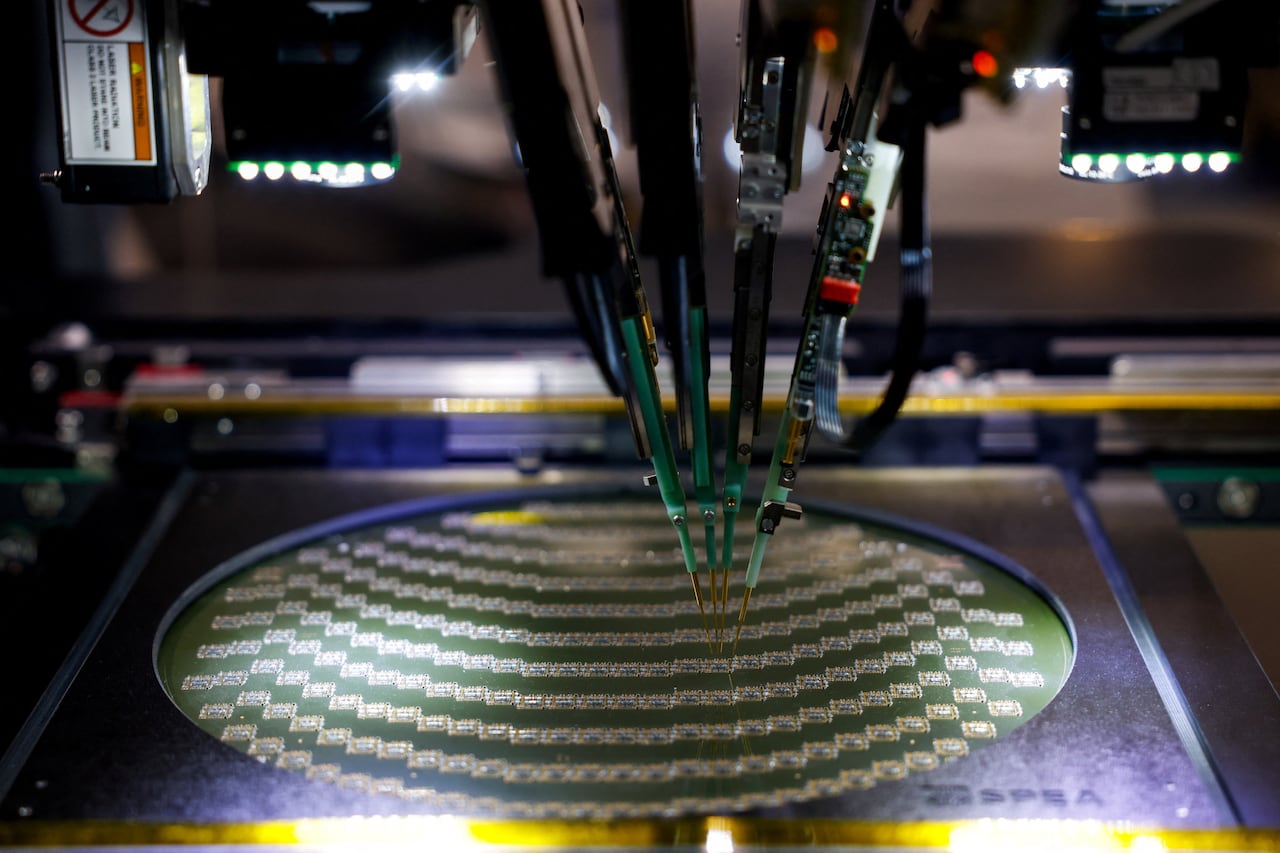 A semiconductor wafer is tested on the SPEA 4080 flying probe system, at SEMICON Taiwan 2025, in Taipei on Sept. 10. (Ann Wang/Reuters)
A semiconductor wafer is tested on the SPEA 4080 flying probe system, at SEMICON Taiwan 2025, in Taipei on Sept. 10. (Ann Wang/Reuters)
TSMC has made significant moves to strengthen its presence outside Taiwan by building state-of-the-art foundries in Germany, Japan and Arizona.
But even as it moves more business offshore, DSET CEO Chang said Taiwan will remain a global chip hub as the industry remains deeply interconnected.
“Currently, they have to send the chips that are produced in Arizona fabs back to Taiwan for packaging," he said, referring to the final stage of the production process that can greatly amplify their efficiency.
Hsiao, Taiwan’s vice-president, said her government’s focus continues to be on strengthening partnerships.
“Taiwan has always sought to leverage our influence in a positive way,” she said. “We will continue to work with friends and partners around the world who share our values and our goals."




